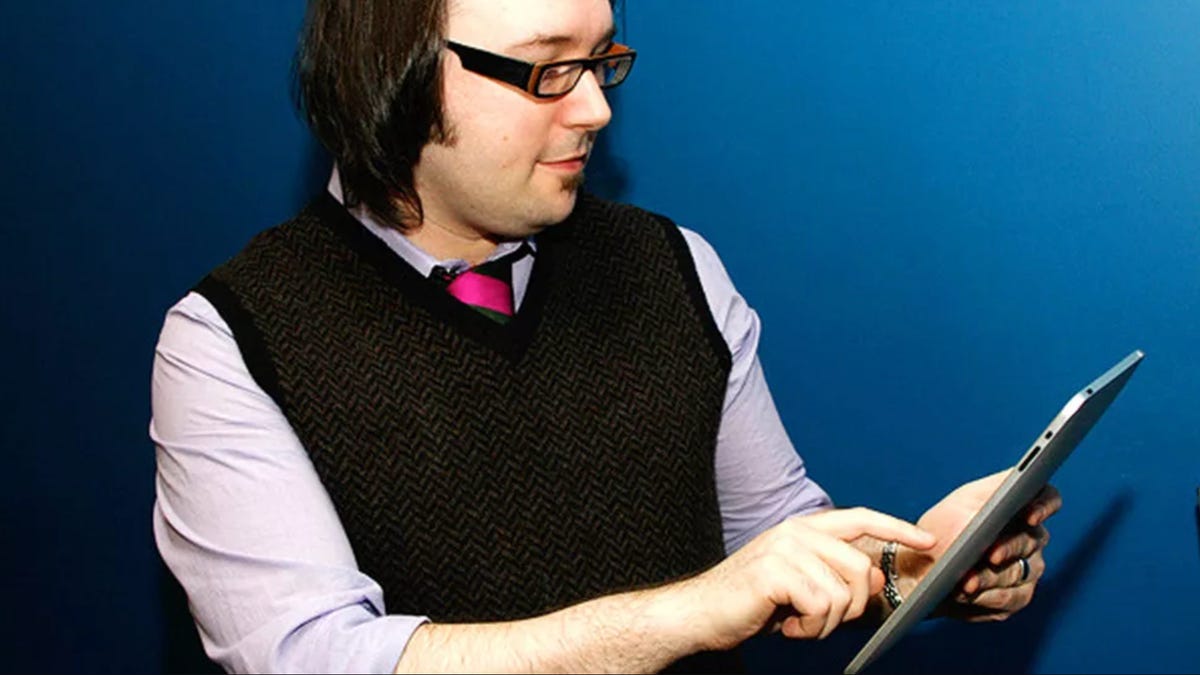iPad's 10th anniversary leaves us asking if Apple's tablet is a computer
Commentary: Asking if an iPad is a computer is like asking if a hot dog is a sandwich.

My 2010 self with a 2010 iPad.
In late 2009, one of the worst-kept secrets in technology was that Apple planned to launch a tablet of some sort, probably within months. Would it be a locked-down device like the iPhone , launched just two years earlier in 2007? Or would it be a more traditional platform like the MacBook , following in the footsteps of personal computers since the early '80s?
"Either the Apple tablet (or iSlate, or whatever it ends up being called) will be a 10-or-so-inch tablet PC with a full Mac OS X operating system; or it will merely be a larger-screen version of the current iPod Touch , which has a closed, limited phone-like OS ... The former would mean it could very likely run any software you'd run on a MacBook, from Firefox to Photoshop, and maybe even install Windows 7 via Boot Camp or Parallels. The latter points to a hermetically sealed ecosystem, where apps would have to be approved and sold through an official app store (as in iTunes)."
Most of that, from the iSlate name to the 10-inch screen ended up being wrong (the iPad launched with a 9.7-inch screen, a spec only recently discarded in favor of a 10.2-inch screen). But the final product, first officially unveiled on stage by Steve Jobs on Jan. 27, 2010 skewed much more towards the latter idea, a closed system, like the iPhone. The key takeaway being that all apps would have to come through preapproved channels.
As soon as the first wave of iPad details were announced, we immediately returned to the question of whether this new device would be considered a computer. The same day as the initial January 27, 2010 iPad announcement, I wrote:
"By some standards, the iPad is essentially a keyboardless laptop, but by others, it's more akin to a portable media player, such as the iPod Touch ... But, even though the device as described by Apple initially feels more like a portable media player and less like a computer, is it fair to kick it out of the computer category entirely?
"One can envision a not-too-distant future where an iPhone-style interface becomes more prevalent on small Netbook and smartbook systems, rather than a full PC OS trickling down to ever-smaller devices ... The other side of the argument is that the iPad's lack of freedom to install basic apps and plug-ins, such as FireFox or even Flash, makes this far too limited a system to be considered a full-fledged computer. Ditto for the apparent lack of multitasking."
While the reference to Flash is dated, the general argument is very similar to the one we're still having today. In the intervening years, the iPad has added all sorts of keyboard docks, a more powerful Pro version, stylus support, and yes, finally a beta version of Photoshop (which is still not quite fully baked).
So I asked the same question again, now that the iPad is 10 years old. Can we call it a computer yet?
"No," was the emphatic response from my colleague Lori Grunin, when I asked if, in 2020, an iPad could be considered a computer. Why? Because its walled garden software ecosystem prevents you from running nonapproved software. What about a Chromebook then, I asked, is that a computer if it can't install and run software? "If you consider just websurfing a computing task, then yes, it's a computer. But if you don't, [a Chromebook is] just a tablet in a laptop design."
Using the first-gen iPad in 2010 for writing.
Back in 2010, my colleague Scott Stein took a broader view, explaining that the look and feel of app-driven operating systems are actually much more useful on small-screen systems. Ten years ago that applied to low-end laptops called Netbooks. Today, you could say the same about small-screen Chromebooks, hybrids, Windows 10 Arm devices or even the first wave of folding PCs.
More 2010 iPad flashbacks
- Hands-on: Gaming on the Apple iPad
- Hands-on: The Apple iPad as e-book reader
- Hands-on: Netflix on the Apple iPad
- Hands-on: Is the Apple iPad a Netbook killer?
"Of course the iPad is a computer," says Scott today, looking back at a decade of evolving iPad hardware. "Is it the computer that replaces all my other computers? No, not yet... but it keeps getting closer, year by year. I keep waiting for it to close the gap. I think it will. But it might take longer than I expected. It's already been 10 years, waiting for it to be everything. But it does some things far better than my laptop, and it's closer to my dream computer of the future than any current MacBook is."
Is an iPad a computer? I still don't know, it's about as clear as asking if a hot dog is a sandwich.

